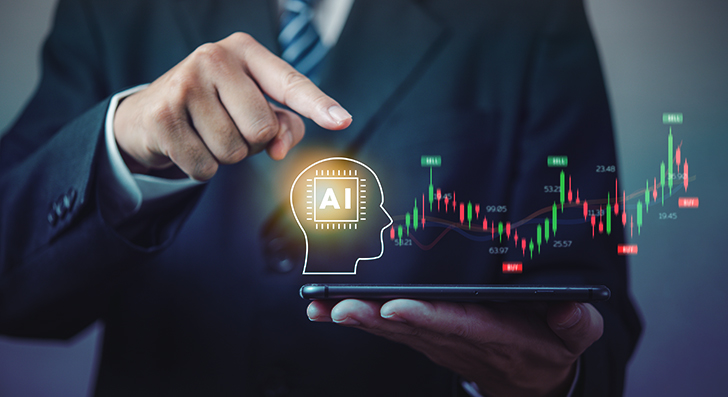Introduction
Have you ever wondered if a machine could predict the stock market better than a human? Imagine a tool that could sift through mountains of data—stock prices, news headlines, even weather patterns—and tell you exactly when to buy or sell. With Artificial Intelligence (AI), this isn’t just a fantasy; it’s happening right now. AI is transforming the way we invest, making it faster, smarter, and potentially more profitable. In this blog, we’ll dive into how AI is revolutionizing stock market predictions, why it matters to Indian investors, and what the future holds—all explained in simple terms with real-life examples and the latest data.
What is AI in Investing?
Let’s start with the basics. AI, or Artificial Intelligence, is like a super-smart computer program that can learn from data and make decisions without human help. Think of it as a brainy assistant that doesn’t need coffee breaks! In the world of investing, AI analyzes heaps of information—like stock prices, company earnings, or even social media buzz—to predict where the market is headed.
There are two main types of AI you’ll hear about in finance:
- Machine Learning: This is like teaching a child to spot patterns. For example, if every time the Reserve Bank of India (RBI) cuts interest rates, the Nifty 50 index jumps, machine learning can spot that trend and predict it might happen again.
- Deep Learning: A step ahead, this uses neural networks (inspired by the human brain) to dig even deeper into data. It’s like having a detective who not only finds clues but also understands the bigger picture—like how global oil prices might affect Reliance Industries’ stock.
In short, AI takes the guesswork out of investing by crunching numbers and finding hidden patterns faster than any human could.
How AI is Used in Stock Market Predictions
The stock market is a wild ride—especially in India, where everything from monsoon rains to Budget announcements can send prices soaring or crashing. Predicting these ups and downs is tough, but AI is changing the game.
Here’s how it works:
- Speedy Data Analysis: AI can process decades of stock data, economic reports, and news in seconds. For instance, it might analyze 20 years of Bombay Stock Exchange (BSE) data to predict how a pharma stock reacts to a new drug approval.
- Spotting Trends: Imagine AI as a hawk-eyed scout. It can pick up on subtle signals—like a spike in Google searches for “Tata Motors” hinting at growing interest—before most investors notice.
- Real-Time Decisions: In a market that moves fast, AI acts like a lightning-fast calculator, helping traders react to news (say, a sudden rupee drop) instantly.
For Indian investors, this is a big deal. Our market is famously volatile—think of the Nifty 50 swinging after a surprise election result. AI can cut through the noise, offering insights based on data, not emotions.
Real-Life Examples of AI in Investing
AI isn’t just a buzzword; it’s already here, working its magic. Let’s look at some examples:
- Global Giants: Companies like Google and Amazon use AI to optimize everything from ad targeting to supply chains. In finance, hedge funds like Renaissance Technologies rely on AI to beat the market, earning billions.
- Indian Innovators: Closer to home, platforms like Zerodha and Upstox are jumping on the AI train. Zerodha’s ‘Kite’ platform uses AI to suggest stocks tailored to your goals—say, finding undervalued gems in the Nifty 500. Upstox, meanwhile, offers AI-driven market insights to help traders stay ahead.
- AI Hedge Funds: Globally, AI-powered hedge funds are outshining traditional ones. The Eurekahedge AI Hedge Fund Index shows these funds have delivered better returns than human-managed funds over the past few years—proof that machines can sometimes outsmart us.
Picture this: during the 2023 Adani stock crash, AI could’ve scanned news, social media, and financials to warn investors faster than any analyst flipping through reports. That’s the power of AI in action.
Benefits and Risks of AI in Investing
Like any tool, AI has its pros and cons. Let’s break it down:
Benefits
- No More Oops Moments: Humans get tired or emotional—AI doesn’t. It sticks to the data, reducing silly mistakes.
- Lightning Speed: AI can analyze a flood of data and spit out predictions in milliseconds, perfect for day traders racing against time.
- Bigger Profits: By spotting trends early—like a surge in renewable energy stocks after a government policy—AI can boost your returns.
Risks
- Tech Overload: Rely too much on AI, and you might miss the human gut feel—like sensing a scam that data doesn’t catch.
- Garbage In, Garbage Out: If AI learns from bad data (say, outdated stock prices), its predictions will be off.
- Ethical Headaches: Could someone use AI to rig the market? It’s a worry regulators are watching.
Think of AI like a car: it can get you to your destination faster, but if the map’s wrong or the driver’s reckless, you’re in trouble.

The Future of AI in Investing
So, where’s this all heading? The global AI market is set to hit $190 billion by 2025, according to Statista, and finance is a big chunk of that. Here’s what’s coming:
- Smarter Predictions: With advancements like quantum computing, AI could get even faster and sharper—imagine it predicting a Nifty crash days before it happens.
- Automated Trading: Picture AI not just advising but trading for you, buying Infosys stock the second it spots a dip. This is already starting with algo-trading platforms.
- India’s Edge: As per a 2023 NASSCOM report, India’s AI industry is growing at 25% annually. That means more homegrown tools for tackling our unique market quirks—like predicting how a weak monsoon might hit agriculture stocks.
But here’s the catch: the market isn’t a math problem. Emotions, politics, and black swan events (like COVID-19) can throw even the best AI off. It’s a helper, not a crystal ball.
Ethical Considerations in AI Investing
With power comes responsibility. AI in investing raises some big questions:
- Fair Play: Could big players use AI to outpace small investors, widening the wealth gap? It’s a risk SEBI (India’s market regulator) is eyeing.
- Transparency: If AI says “sell Reliance,” shouldn’t you know why? Investors deserve clear answers, not a black box.
- Manipulation: Imagine AI spreading fake news to crash a stock price—scary, right? That’s why oversight matters.
In 2023, SEBI proposed guidelines for AI in trading, stressing accountability. The message? Use AI, but keep it honest.
Conclusion
AI is rewriting the rules of investing, blending cold, hard data with lightning-fast decisions. For Indian investors—whether you’re trading on the NSE or eyeing a mutual fund—it’s a game-changer, offering a sharper lens on our rollercoaster market. From Zerodha’s smart tools to global AI hedge funds, the proof is in the profits.
But it’s not perfect. AI can stumble over bad data or ethical traps, and it can’t predict every twist—like a sudden GST hike. The key? Embrace it as a trusty sidekick, not a replacement for your instincts.
As AI evolves, it’s up to us—investors, regulators, and innovators—to harness its potential while keeping the risks in check. So, next time you’re eyeing that stock tip, ask yourself: what would AI do? The future of investing is here—are you ready to ride the wave?
FAQs for AI in Investing
1. What is AI in investing, and how does it work?
Answer: AI in investing refers to using Artificial Intelligence to analyze data and predict stock market trends. It works by processing vast amounts of information—like stock prices, news, or economic reports—using tools like machine learning to spot patterns and make fast, data-driven decisions.
2. How can AI help Indian investors in the stock market?
Answer: AI helps Indian investors by quickly analyzing volatile market factors—like monsoon impacts or Budget announcements—offering real-time insights. Platforms like Zerodha use AI to suggest stocks, helping investors make smarter choices in a fast-moving market like the NSE or BSE.
3. Is AI in investing better than human predictions?
Answer: AI can process data faster and avoid emotional biases, often making it more accurate than humans. However, it’s not foolproof—it relies on good data and can’t always predict unexpected events like a sudden political crisis.
4. What are the risks of using AI for stock market predictions?
Answer: Risks include relying too much on AI without human judgment, using flawed data leading to wrong predictions, and ethical concerns like market manipulation. It’s a powerful tool, but it’s not perfect.
5. What’s the future of AI in stock market investing?
Answer: The future looks promising with smarter AI tools, automated trading, and growth in India’s AI sector (25% annually, per NASSCOM 2023). But it’ll work best alongside human instincts, not as a standalone solution.




